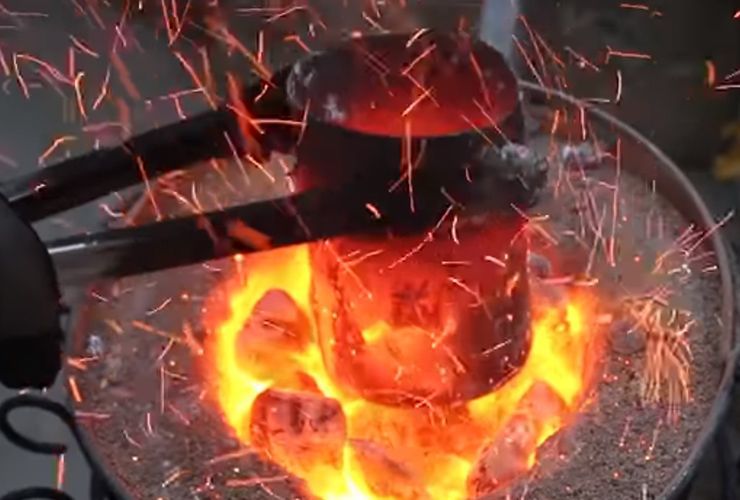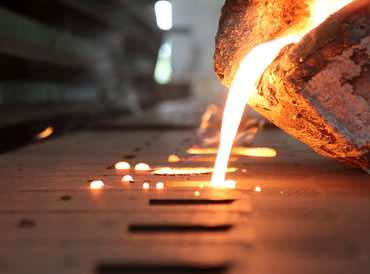The science and precision behind each Aluminum Casting cycle
Wiki Article
A Deep Study Steel Foundries: Trick Providers and Their Influence On Manufacturing
Steel shops are indispensable to modern-day manufacturing, providing essential solutions that form the production landscape. They specialize in various casting procedures, ensuring precision and quality in steel components. The advancement of innovation and sustainable techniques has additionally influenced their procedures. As sectors increasingly depend on these shops, understanding their essential services and the ramifications for production efficiency becomes important. What developments and obstacles exist in advance for this essential industry?Recognizing Metal Casting Procedures
Steel spreading procedures transform fluid metal right into solid items with different methods, each tailored to specific applications and materials. Amongst one of the most common methods are sand casting, investment spreading, and pass away spreading, each offering unique benefits. Sand spreading utilizes a mold and mildew constructed from sand, allowing the production of large components at a reasonably inexpensive. Investment casting, on the various other hand, entails developing a wax pattern that is covered in ceramic, producing complicated and extremely detailed shapes. Pass away casting employs high pressure to force liquified metal into a mold, which is optimal for automation of tiny, exact elements. These procedures permit a wide variety of metals to be utilized, consisting of light weight aluminum, steel, and bronze, accommodating diverse commercial demands. The choice of a proper spreading technique depends on elements such as called for resistances, manufacturing quantity, and material homes, affecting the overall efficiency and efficiency of the end items.The Importance of Precision Casting
Accuracy casting plays an important duty in creating elements that demand high precision and detailed information. This approach, usually referred to as financial investment casting, permits intricate geometries and tight tolerances, making it essential in sectors such as aerospace, vehicle, and medical tools. By utilizing wax patterns that are coated with a ceramic shell, accuracy casting enables the development of components with smooth surfaces and very little finishing requirements.
Alloy Advancement and Material Selection
In the domain name of steel shops, alloy advancement and material choice are crucial elements influencing the performance and durability of cast components. The choice of alloy straight influences mechanical buildings, such as ductility, stamina, and corrosion resistance, vital for meeting certain application needs. Factories typically engage in extensive research and testing to maximize alloy make-ups, customizing them to the unique needs of different industries, including vehicle, aerospace, and building and construction.Product choice additionally involves evaluating elements like manufacturability, schedule, and cost, guaranteeing that the picked alloy lines up with manufacturing abilities and budget plan constraints. Advanced simulation devices and logical approaches are employed to forecast the actions of various alloys under differing conditions, supplying important understandings for designers. Inevitably, effective alloy growth and material option allow foundries to create high-grade elements that boost functional performance and reliability in their designated applications.
Ingenious Molding Methods
Revolutionizing the production process, cutting-edge molding methods play an essential duty in improving the effectiveness and top quality of cast parts in steel factories. Methods such as 3D printing and vacuum cleaner molding have actually arised as video game changers, enabling intricate layouts and lowered lead times. These approaches allow factories to create molds with complicated geometries that traditional strategies usually have a hard time to accomplish.In addition, making use of innovative products for mold and mildews, such as composite resins, enhances resilience and minimizes wear, bring about longer manufacturing runs. Rapid prototyping more allows for quick versions, promoting faster advancement cycles and making it possible for manufacturers to react more promptly to market needs.
Automation in molding processes enhances operations, decreasing human error and increasing throughput. By integrating these ingenious strategies, steel factories can maximize their manufacturing abilities, inevitably leading to better castings and enhanced total efficiency in the competitive production landscape.
Quality Assurance in Metal Foundries
Quality control in steel factories is important for making sure the stability and efficiency of cast items. It encompasses numerous assessment techniques and standards, in addition to flaw discovery techniques to determine prospective problems early in the manufacturing process. Additionally, robust quality control procedures are vital for keeping consistency and conference sector demands.Assessment Techniques and Standards
Guaranteeing the integrity of metal castings requires strenuous inspection techniques and adherence to developed standards. Steel foundries execute numerous evaluation techniques to assess the quality of actors items, including visual inspections, dimensional checks, and non-destructive screening (NDT) These techniques assist to identify potential issues early in the manufacturing process. Standards such as ASTM and ISO supply standards for acceptable quality levels and Metal Foundry testing treatments, ensuring that factories preserve constant high quality throughout their manufacturing lines. Conformity with these standards not only enhances item reliability however also fosters trust amongst clients. By prioritizing assessment methods, metal shops can reduce risks connected with flaws and assurance that their spreadings meet consumer requirements and industry needs.Defect Detection Techniques
Efficient issue detection techniques are important to maintaining high requirements in steel foundries. These techniques encompass a variety of techniques focused on identifying flaws in castings before they are refined better. Typical techniques include aesthetic evaluation, which depends on the trained eye of assessors to find surface area flaws, and non-destructive testing (NDT) methods such as ultrasonic testing and radiography, which reveal internal flaws without damaging the material. In addition, automated systems utilizing artificial intelligence and artificial knowledge are significantly made use of to examine information and recognize abnormalities. Each approach plays a vital role in making sure the stability of the last product, reducing waste, and enhancing total production performance. By implementing durable problem detection processes, factories can promote their reputation for quality.Quality Control Processes
In steel factories, an extensive quality assurance procedure is necessary for generating reliable and high-performing spreadings. This procedure incorporates numerous stages, consisting of basic material inspection, in-process surveillance, and last product examination. By implementing standardized treatments, shops can systematically recognize and fix defects prior to they escalate right into costly issues. Advanced methods, such as non-destructive screening and metallurgical analysis, are employed to evaluate the integrity of spreadings. Furthermore, documentation and traceability are essential components, ensuring that each action of manufacturing meets rigid high quality criteria. Educating workers in high quality control practices even more enhances the effectiveness of these processes. Eventually, a durable high quality assurance structure not just enhances operational performance however likewise reinforces consumer count on and complete satisfaction in the factory's result.The Role of Modern Technology in Foundry Workflow
Innovation transforms shop procedures by enhancing performance, precision, and safety and security. Automation plays a crucial duty, simplifying processes such as mold production and steel putting, consequently lowering labor expenses and reducing human error. Advanced computer-aided layout (CAD) software application makes it possible for specific modeling of components, assisting in quicker adjustments and versions during manufacturing.The assimilation of robotics in jobs like product handling and completing processes enhances performance and warranties regular top quality. Real-time surveillance systems and information analytics supply important insights into operational performance, permitting for timely interventions and upkeep, which ultimately prolongs devices life expectancy

The adoption of 3D printing modern technology additionally enables quick prototyping and customized remedies, substantially minimizing lead times. In addition, innovative products technology enhances the buildings of alloys, improving casting performance. To sum up, technical improvements are necessary in enhancing foundry operations, enabling manufacturers to fulfill the boosting demands for quality and effectiveness in the affordable steel market.
Environmental Considerations in Steel Casting
Ecological considerations in steel spreading play a substantial function in forming market methods. Effective waste monitoring, progressed exhaust control innovations, and using lasting products are necessary for minimizing the environmental impact of factories. Addressing these elements is essential for promoting an extra lasting future in steel production.
Waste Management Practices
Reliable waste management methods are crucial in the metal spreading industry to minimize environmental impacts. Metal Foundry. Shops create various kinds of waste, consisting of steel sand, scrap, and chemical deposits. Applying recycling programs permits for the repurposing of steel scrap, minimizing the need for virgin materials and minimizing land fill payments. Furthermore, foundries usually utilize sand recovery processes, which recoup and recycle sand numerous times, consequently decreasing waste generation. Proper disposal methods for unsafe materials, such as binding agents and solvents, are important to avoid dirt and water contamination. Additionally, worker training on waste partition and reduction strategies can boost general performance and sustainability. With these techniques, metal foundries can markedly decrease their environmental impact while keeping manufacturing effectivenessExhaust Control Technologies
As the metal spreading sector advances, the implementation of advanced discharge control innovations becomes significantly necessary for decreasing damaging toxins released during production processes. These innovations include numerous techniques, consisting of electrostatic precipitators, scrubbers, and catalytic converters, which properly capture and reduce the effects of discharges prior to they enter the ambience. By integrating such systems, foundries can substantially decrease particulate issue, unstable organic substances, and other dangerous exhausts. In addition, conformity with strict ecological regulations not only alleviates environmental influence yet additionally improves the sector's reputation and operational performance. The adoption of these innovations reflects a dedication to sustainable techniques, making certain that metal spreading operations can satisfy the growing need while prioritizing ecological health and security.Sustainable Products Usage
Lasting materials use in metal casting plays an important function in reducing the industry's environmental footprint. Shops are increasingly taking on recycled steels, which significantly minimize the demand for virgin sources and reduced power consumption throughout the manufacturing process. In addition, making use of environmentally friendly binders and additives boosts the sustainability of casting procedures by minimizing hazardous discharges and waste. Innovations in material scientific research likewise enable the growth of naturally degradable options that do not jeopardize product high quality. Moreover, foundries are executing life-cycle evaluations to examine the environmental impact of products throughout their life expectancy, promoting even more accountable sourcing and usage. Overall, these methods contribute to an extra lasting and ecologically aware steel casting sector, lining up with global efforts to decrease carbon footprints.Regularly Asked Inquiries
What Are the Main Kind Of Steel Utilized in Shops?
Factories primarily utilize metals such as iron, magnesium, copper, and light weight aluminum. These materials are picked for their distinct buildings, which affect the spreading procedure and the performance features of the end products made.How Do Foundries Guarantee Worker Safety And Security Throughout Procedures?
Foundries assure worker safety through strenuous training, correct equipment, air flow systems, and adherence to security regulations. Routine evaluations, personal protective equipment, and emergency situation procedures even more boost a secure working environment for workers taken part in steel production.What Is the Common Lead Time for Casting Manufacturing?
The normal preparation for spreading production varies, usually ranging from a couple of weeks to a number of months. Aspects affecting this timeline include complexity of the design, product availability, and the factory's production ability and organizing.How Do Factories Manage Waste and Recycling Processes?
Shops handle waste and recycling by applying processes such as metal reclamation, sand recycling, and correct disposal of harmful materials, therefore minimizing ecological effect and advertising sustainability in their operations while adhering to regulative standards.What Industries The Majority Of Typically Make Use Of Metal Factory Solutions?
Metal shop solutions are mainly used in industries such as auto, building, machinery, and aerospace production. These fields depend on shops for producing actors metal components necessary for numerous applications and item advancement.Steel factories are important to modern-day manufacturing, providing necessary services that shape the manufacturing landscape. Steel casting processes change fluid steel right into strong objects via numerous methods, each customized to certain applications and products. As innovation developments, the importance of accuracy casting proceeds to grow, driving development and performance in metal factory operations. Revolutionizing the production process, ingenious molding methods play a critical function in enhancing the effectiveness and top quality of actors elements in metal factories. In metal factories, a thorough top quality guarantee process is crucial for creating high-performing and reputable castings.
Report this wiki page